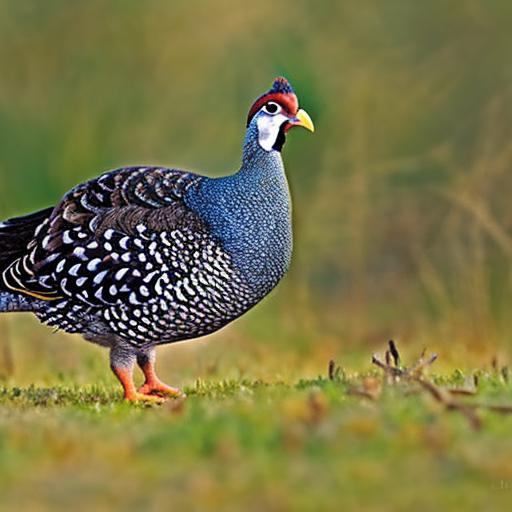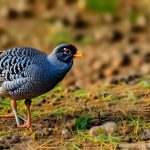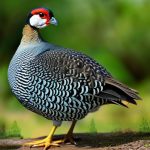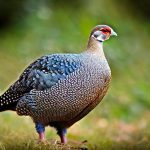Guinea fowl are known for their curious and social nature. They are highly active birds that spend most of their time foraging for food and exploring their surroundings. They are also known to be excellent flyers and can easily escape from predators. Guinea fowl are also very vocal birds, often making loud calls to communicate with each other. Understanding their behavior is crucial in finding effective ways to deter them from unwanted areas.
Guinea fowl are highly social birds and prefer to live in flocks. They are also known to be territorial and will defend their space from intruders. This territorial behavior can lead them to be aggressive towards other animals or humans that they perceive as a threat. Additionally, guinea fowl are known to be attracted to shiny objects and bright colors, which can lead them to peck at and damage certain structures or objects. Understanding these behaviors can help in developing strategies to deter guinea fowl from causing damage or becoming a nuisance.
Key Takeaways
- Guinea fowl are social birds that prefer to roost in trees and will return to the same spot each night.
- Physical barriers such as fences and netting can be effective in keeping guinea fowl out of specific areas.
- Visual deterrents like scarecrows and shiny objects can help to deter guinea fowl from entering certain areas.
- Sound deterrents such as loud noises or predator calls can be used to scare guinea fowl away from unwanted areas.
- Removing food sources such as fallen fruits and grains can help to discourage guinea fowl from frequenting certain areas.
- Creating safe zones with dense vegetation or shelters can provide guinea fowl with an alternative roosting spot.
- If all else fails, seeking professional help from wildlife experts or pest control services may be necessary to effectively manage guinea fowl behavior.
Creating Physical Barriers
One effective way to deter guinea fowl from unwanted areas is by creating physical barriers. This can include installing fences or netting around gardens or other areas where guinea fowl may cause damage. Fences should be at least 4-6 feet high to prevent guinea fowl from flying over them. Netting can also be used to cover plants or crops to prevent guinea fowl from accessing them. It is important to ensure that the barriers are secure and do not have any gaps that guinea fowl can squeeze through.
Another physical barrier that can be effective in deterring guinea fowl is the use of scarecrows or other visual deterrents. Scarecrows can be placed in areas where guinea fowl are causing damage to create a visual deterrent. Additionally, reflective tape or shiny objects can be hung in the area to create a visual distraction for the guinea fowl. These visual deterrents can help to disrupt the guinea fowl’s behavior and discourage them from entering the area.
Utilizing Visual Deterrents
In addition to physical barriers, visual deterrents can also be effective in deterring guinea fowl from unwanted areas. One common visual deterrent is the use of predator decoys, such as fake owls or hawks. These decoys can create the illusion of a predator in the area, which can scare off guinea fowl. It is important to move the decoys around periodically to prevent the guinea fowl from becoming accustomed to them.
Another visual deterrent that can be effective is the use of motion-activated devices, such as sprinklers or lights. These devices can startle guinea fowl when they enter the area, causing them to flee. Additionally, hanging shiny objects, such as CDs or aluminum foil strips, can create a visual distraction for guinea fowl and deter them from entering the area. These visual deterrents can help to disrupt the guinea fowl’s behavior and discourage them from causing damage.
Implementing Sound Deterrents
Sound deterrents can also be effective in deterring guinea fowl from unwanted areas. One common sound deterrent is the use of ultrasonic devices that emit high-frequency sounds that are unpleasant for guinea fowl. These devices can be placed in the area where guinea fowl are causing damage and can help to deter them from entering the area.
Another sound deterrent that can be effective is the use of noise-making devices, such as air horns or whistles. These devices can be activated when guinea fowl enter the area, creating a loud and startling noise that can scare them off. Additionally, playing recordings of predator calls or distress calls of other birds can also be effective in deterring guinea fowl. These sound deterrents can help to disrupt the guinea fowl’s behavior and discourage them from causing damage.
Removing Attractive Food Sources
Guinea fowl are attracted to areas with abundant food sources, so removing these sources can help deter them from unwanted areas. This can include cleaning up spilled birdseed, fruits, or vegetables that may attract guinea fowl. It is also important to secure garbage cans and compost bins to prevent guinea fowl from accessing food scraps.
Additionally, covering or removing any exposed soil in gardens or flower beds can help deter guinea fowl from foraging in these areas. Mulching or using ground cover plants can help prevent guinea fowl from accessing the soil and disturbing plants. Removing attractive food sources can help reduce the likelihood of guinea fowl causing damage in these areas.
Establishing Safe Zones for Guinea Fowl
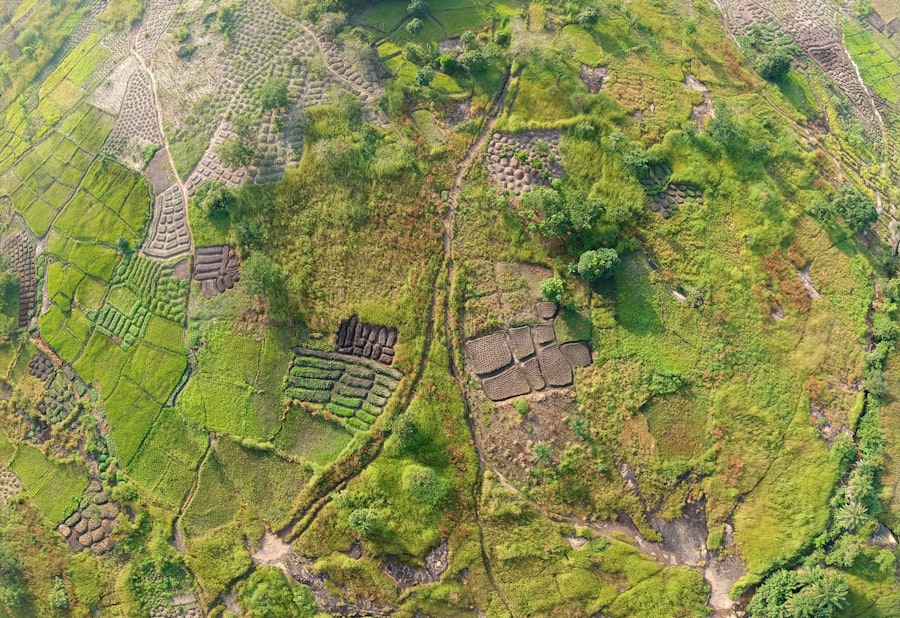
In some cases, it may be beneficial to establish safe zones for guinea fowl where they can forage and roam without causing damage. This can include designating specific areas of the property where guinea fowl are allowed to access and providing food and water sources in these areas. By providing an alternative space for guinea fowl to forage, they may be less likely to venture into unwanted areas.
Additionally, creating habitat enhancements such as brush piles or shrubbery can provide shelter and nesting sites for guinea fowl, encouraging them to stay in designated areas. Establishing safe zones for guinea fowl can help reduce conflicts and damage caused by these birds while still allowing them to roam freely.
Seeking Professional Help if Necessary
If efforts to deter guinea fowl on your own are not successful, it may be necessary to seek professional help. Wildlife control experts or pest management professionals can provide guidance on effective deterrent methods and may offer services to help remove or relocate guinea fowl if necessary.
Additionally, contacting local agricultural extension offices or wildlife agencies can provide valuable resources and information on managing guinea fowl populations. These professionals can offer advice on legal and ethical considerations when dealing with guinea fowl and may provide assistance in developing a comprehensive management plan.
In conclusion, understanding guinea fowl behavior and implementing effective deterrent methods are crucial in managing these birds and preventing damage to property. By utilizing physical barriers, visual and sound deterrents, removing attractive food sources, establishing safe zones, and seeking professional help if necessary, it is possible to effectively deter guinea fowl from unwanted areas while still allowing them to thrive in their natural habitat.
If you’re looking for ways to keep guinea fowl out of your yard, you might also be interested in learning about the importance of providing adequate space for your chickens in their coop. Check out this informative article on how big a coop needs to be for a chicken to ensure your feathered friends have enough room to thrive.
FAQs
What are guinea fowl?
Guinea fowl are a type of bird native to Africa. They are known for their distinctive spotted feathers and loud, chattering calls.
Why do guinea fowl come into yards?
Guinea fowl are often attracted to yards and gardens because they can find food such as insects, seeds, and small plants.
How can I keep guinea fowl out of my yard?
There are several methods to keep guinea fowl out of your yard, including using fences, netting, or repellents. You can also try to discourage them by removing their food sources.
Are guinea fowl harmful to my yard?
While guinea fowl can help control insect populations, they can also damage gardens and landscaping by scratching and pecking at plants.
Are there any natural deterrents for guinea fowl?
Some natural deterrents for guinea fowl include using predator decoys, such as fake owls or snakes, and planting strong-smelling herbs or flowers that guinea fowl dislike.
Can I legally remove guinea fowl from my property?
Laws regarding the removal of guinea fowl vary by location, so it’s important to check with local authorities before taking any action. In some areas, guinea fowl may be considered protected wildlife.
Meet Walter, the feathered-friend fanatic of Florida! Nestled in the sunshine state, Walter struts through life with his feathered companions, clucking his way to happiness. With a coop that’s fancier than a five-star hotel, he’s the Don Juan of the chicken world. When he’s not teaching his hens to do the cha-cha, you’ll find him in a heated debate with his prized rooster, Sir Clucks-a-Lot. Walter’s poultry passion is no yolk; he’s the sunny-side-up guy you never knew you needed in your flock of friends!

